What Is a Plant-Based Diet?

When it comes to different eating habits, diets, and lifestyles, the terminology can get confusing. So becoming familiar with different dietary choices related to meat reduction can be helpful when considering reducing meat and animal-products in your diet. “Plant-based” has become a catch-all term for meatless meals, but there are a few distinct categories.
What is a plant-based diet?
The term “plant-based” encompasses a variety of dietary options that include low (or no) amounts of animal-source foods, such as dairy and meat, and consist primarily of high amounts of plant-source foods such as fruits, vegetables, grains, legumes, and plant-derived products. In general, a product or food can be categorized as “plant-based” if it doesn’t include any ingredients made from an animal and is made from a plant source.
Rice and beans, avocado toast, hummus, roasted Brussels sprouts, and a Beyond Meat burger are all examples of plant-based foods, while macaroni and cheese, pizza, quiche, shrimp cocktail, or an egg-based bread like brioche, would not be classified as plant-based foods because they contain dairy, eggs, or seafood.
There is no one exact way to eat plant-based, but rather a variety of options ranging from strictly no-animal products (vegan) to mostly-plants but occasionally eating some meat and animal-based foods, known as “flexitarian”.
Plant-Based Diets: Flexitarian Vs. Vegan Vs. Vegetarian
So, what’s the difference between a flexitarian diet, vegetarian, and a vegan diet?
Flexitarian means following a diet that consists primarily of plant-based foods, but occasionally incorporating small quantities of animal-based products (meat, seafood, and dairy) into meals. The idea is to reduce the consumption of most animal products, but being flexible, a.k.a. “flexitarian,” in one’s dietary choices when needed or desired.
Vegetarian means avoiding all meat (no beef, chicken, seafood or pork), but incorporating some non-meat animal products like fluid dairy, cheese, eggs, and honey into a diet.
Vegan means not eating any food or ingredient derived from an animal, such as meat, seafood, dairy, eggs, or honey. Many practicing vegans also extend their dietary choices into other areas of their lifestyle, such as not wearing leather and not purchasing products made with animal ingredients. The term “vegan” was coined by English animal-rights activist Donald Watson in 1944, and it referred to individuals who fully abstains from all animal products for ethical reasons. Today, someone who identifies as a vegan, can be making the choice for a number of reasons including environmental conservation, animal welfare, or personal health.
What are the benefits of a plant-based diet and reducing meat consumption?
For Your Health
Plant-based ingredients and foods, like fruits, vegetables, nuts, legumes, and grains are typically low in saturated fat and cholesterol, high in fiber, and excellent sources of vitamins and minerals. Adding more plant-based meals and consuming less meat in your diet has been shown to reduce the risk of diabetes, heart disease, and kidney disease.
That being said, not all plant-based foods are created equal. Sugar is entirely plant-based, and so is bleached (refined) white flour, but these ingredients retain few nutrients, and nutritionists agree that these foods should be consumed in moderation. Focusing on whole grains, foods rich in omega-3 fatty acids (walnuts, chia and hemp seeds, algae-based oils, etc), fruits, vegetables, and unsaturated fats provide a protective health benefit.
For the Environment
There’s an overwhelming body of research showing the detrimental impact of industrial livestock production on the environment. A predominately plant-based diet is generally more sustainable than one centered on meat (especially red meat) and dairy products because industrial animal agriculture uses more land, water, and natural resources than plant-based foods. Livestock production alone contributes an estimated 14.5% of all global greenhouse gas emissions from human activities — more than the entire transportation sector.
Meatless Monday is a flexible meat-free weekly practice that can be shaped to fit individual preferences and lifestyles. The only foundational requirement of Meatless Monday involves avoiding meat (pork, chicken, beef, seafood) one day a week. People choose to practice Meatless Monday as vegans, vegetarians, and flexitarians. It’s an easy way to become more familiar with plant-based foods and kick-start a healthy eating habit. Research has shown that people who practice Meatless Monday are able to reduce their meat consumption and eat more plant-based meals and fruits and vegetables throughout the week.

